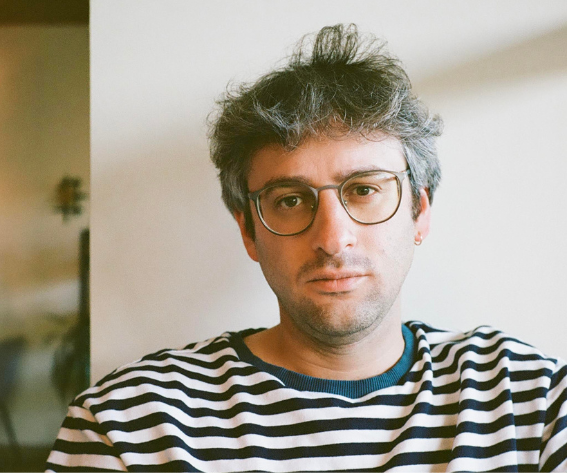We last spoke with Gage Oxley a few months ago, when his short film, ‘This World We Live In‘, won our May 2017 Film of the Month award. Recently, we presented our Film of the Year 2017 distinction – and Gage’s film was selected as the runner-up. Back then, he was already very excited about working on a new project, ‘Pulse’ – and since it was released a few weeks ago, we decided to find out more about the film and catch up with Gage’s recent work.
JL: Gage, it’s great to chat with you again. We last spoke in June 2017, and since then, ‘This World We Live’ In has garnered recognition and quite a few awards. Had you expected this overwhelmingly positive response?
Gage: It’s so lovely to chat with you again, I can’t believe it’s been so long! ‘This World We Live In’ was a wonderful project to work on, and I am very proud of how well it’s done, especially as it was done with such little time, and on such a minute budget. I am glad that it is getting the attention it needs, as Chemsex is a really important issue to be open and converse about, so those who are in difficult positions and are more vulnerable have platforms to talk. We finished the festival run for the film in South Africa, which really is something I never thought I’d say: that such a personal film would be showing to audiences on multiple continents over a year after we made it. We began work on ‘Pulse’ in the midst of all of the festival runs and awards, which definitely shaped our attitude to the film.
JL: In our last interview, you briefly told us about your new project, ‘Pulse’, and your sense of excitement about working on it. Can you let us know what the film is about?
Gage: Similarly to my other film projects, ‘Pulse’ is a very personal project which broke me apart and put me back together a fair few times throughout it being written, rehearsed, filmed and eventually released. It is a 5-minute-long, one-continuous-take, screen-dance film which explores one man’s inner conflict of his own sexuality. It’s a story that many of us have experienced, from the denial, the pain and determination to change and be the same right the way through to acceptance, pride and celebration. The film also reflects on some of the recent hardships the gay community face, from homophobia and attacks. It was made through the year where the UK was commemorating 50 years of the partial decriminalisation of homosexuality, and we actually had our final rehearsal at the exact time the motion was passed fifty years before. Throughout the creation, where I worked with Samuel Curry (lead actor) and Michael Houghton (Director of Photography), the film changed and adapted based on my own realisations and struggles with my own sexuality.
JL: Was it an idea that stemmed from your work on ‘This World We Live In’, or have you had it before starting work on your previous film?
Gage: We shot ‘This World We Live In’ in December 2016, and this idea had been swirling around at the back of my mind for a few months before. I finally wrote the original script on New Years Eve just a week after we completed production of TWWLI, while I was hiding out in a remote fishing village in Greece, trying to find my feet after the rather intense production! From there, we cast Samuel and began work on rehearsing and breathing the story right until we shot the film in Summer.
JL: What is the main point of similarity between these two projects?
Gage: I think the main similarity between the two projects is the internalised emotions of pain, confusion and hope. We find Joey being caught by more negative emotions, and falling into that trap as many of us do, but there is still motivation and hope at the end of the film. The same with Daniel in ‘Pulse’, he has so much life, joy and hope – which makes it even more devastating when there’s a prospect of that being lost at the hands of homophobia.
JL: And what sets them apart – one marked difference?
Gage: For me, the biggest difference is the run-time. From TWWLI’s rather involved 20-minute runtime to ‘Pulse”s bitesized 5-minute runtime, we still gain a sense of character and story. We travel through so many emotions which I think makes it more powerful as the audience can understand a sense of the overwhelming feelings that Daniel faces. For the team and I who created both films, I think the much shorter runtime was a challenge in that we had so much to tell in so little time; but I am so proud and pleased with how it has come out.
JL: Anything you would like to share about the shooting process: how long did it last, where did it take place, how did you gather the crew?
Gage: The pre-production and rehearsal period took around 6-9 months, but the shooting process was one day, where we had about 3.5 hours to get the shot we had been working on for so long. We’re very proud to continue our work in Leeds, UK, where the first films were made by Louis Le Prince in 1888; many of the cast and crew involved in the film are from Leeds or the surrounding areas, which is really important to us to show that the North of England is a fantastic place to work in film, and there are so many talented people around.
JL: Films exist to entertain us, but they also serve more complex purposes: they inform, challenge beliefs and attitudes and open our eyes to situations we might not be immediately aware of. We found your previous project wonderfully evocative with regard to all these dimensions – how does ‘Pulse’ do, in your opinion?
Gage: Thank you, that’s really kind, and I’m glad you found it does! For me, ‘Pulse’ expands on what I always aim to craft. I found this project far more brutal in its story and I think it was crafted with a tremendous amount of heart and passion from everyone involved, and that really does show. I think ‘Pulse’ is a really raw, honest film that puts a very prominent feeling that many LGBTQ* people find onto screen, and speaks thousands of words through the surrealist movement, without uttering a single word. I think as well, ‘Pulse’ is a film about love, and while it explores themes of sexuality and is made with the LGBTQ* community in our hearts, this is a film accessible to all.
JL: Has ‘Pulse’ already gather some recognition, in the short time that it’s been out?
Gage: Yes, we’re super excited to have been in the Official UK Industry Selection for BFI Flare, London’s premier LGBTQ* film festival. We’ve had some incredible letters, comments and messages from many viewers who have seen our film and have reached out to share their thoughts. Many of them are very overwhelming, and both heartbreaking and heartwarming. I feel very lucky and humbled to have had this film affect people, and to hear from them is really remarkable. To share that with the wonderful cast and crew who have invested their time and energy into this film which feels such a huge part of me, is a feeling of joy that cannot be explained. We make films to create a platform, to spark discussions and debates – that is exactly what it is doing and I couldn’t be more happy.
JL: What’s the next step for you – going straight back to work, or having a quiet time for a while and enjoying the success?
Gage: There’s always the next project(s), which I’m really looking forward to! ‘Pulse’ feels like more of a film with heart and light; the next one touches on desire and hedonism, so quite a stark difference! And, of course, we’ll still be living ‘Pulse’ which is online now, and will appear in a few international festivals this year.
JL: Gage, thank you very much for your time. We’re always very happy to see talented filmmakers as yourself get credit for their hard work. Best of luck with your new project!
Gage: Thank you! It’s always great to connect with TMFF, thank you for supporting young, independent filmmakers who are trying to get their voices heard!









Leave a reply